RingModulator
RingModulator can produce complex, bell-like enharmonic sounds.
|
Cubase LE |
Cubase AI |
Cubase Elements |
Cubase Artist |
Cubase Pro |
Nuendo |
|
|---|---|---|---|---|---|---|
|
Included with |
X |
X |
X |
X |
X |
X |

Ring modulators work by multiplying two audio signals. The ring modulated output contains added frequencies generated by the sum of, and the difference between, the frequencies of the two signals.
RingModulator has a built-in oscillator that is multiplied with the input signal to produce the effect.
Oscillator
- Waveform buttons
-
Allow you to select the oscillator waveform: square, sine, saw, or triangle.
- LFO Amount
Controls how much the oscillator frequency is affected by the LFO.
- Env. Amount
Controls how much the oscillator frequency is affected by the envelope that is triggered by the input signal. Left of center, a loud input signal decreases the oscillator pitch, whereas right of center the oscillator pitch increases if it is fed a loud input.
- Frequency
Sets the oscillator frequency ± 2 octaves within the selected range.
- Roll-Off
Attenuates high frequencies in the oscillator waveform, to soften the overall sound. This is best used with harmonically rich waveforms (square or saw, for example).
- Range
-
Determines the frequency range of the oscillator in Hz.
LFO
- Waveform buttons
-
Allow you to select the LFO waveform: square, sine, saw, or triangle.
- Speed
Sets the LFO speed.
- Env. Amount
Controls how much the input signal level – via the envelope generator – affects the LFO speed. With negative values, a loud input signal slows down the LFO, whereas positive values speed it up at loud input signals.
- Invert
Inverts the LFO waveform for the right channel of the oscillator, which produces a wider stereo effect for the modulation.
Envelope Generator
The envelope generator parameters control how the input signal is converted to envelope data, which can then be used to control oscillator pitch and LFO speed.
- Attack
Controls how fast the envelope output level rises in response to a rising input signal.
- Decay
Controls how fast the envelope output level falls in response to a falling input signal.
- Lock R>L
If this button is activated, the L and R input signals are merged, and produce the same envelope output level for both oscillator channels. If the button is deactivated, each channel has its own envelope that affects the two channels of the oscillator independently.
Level Settings
- Mix
Sets the level balance between the dry signal and the wet signal.
- Output
Sets the output level.